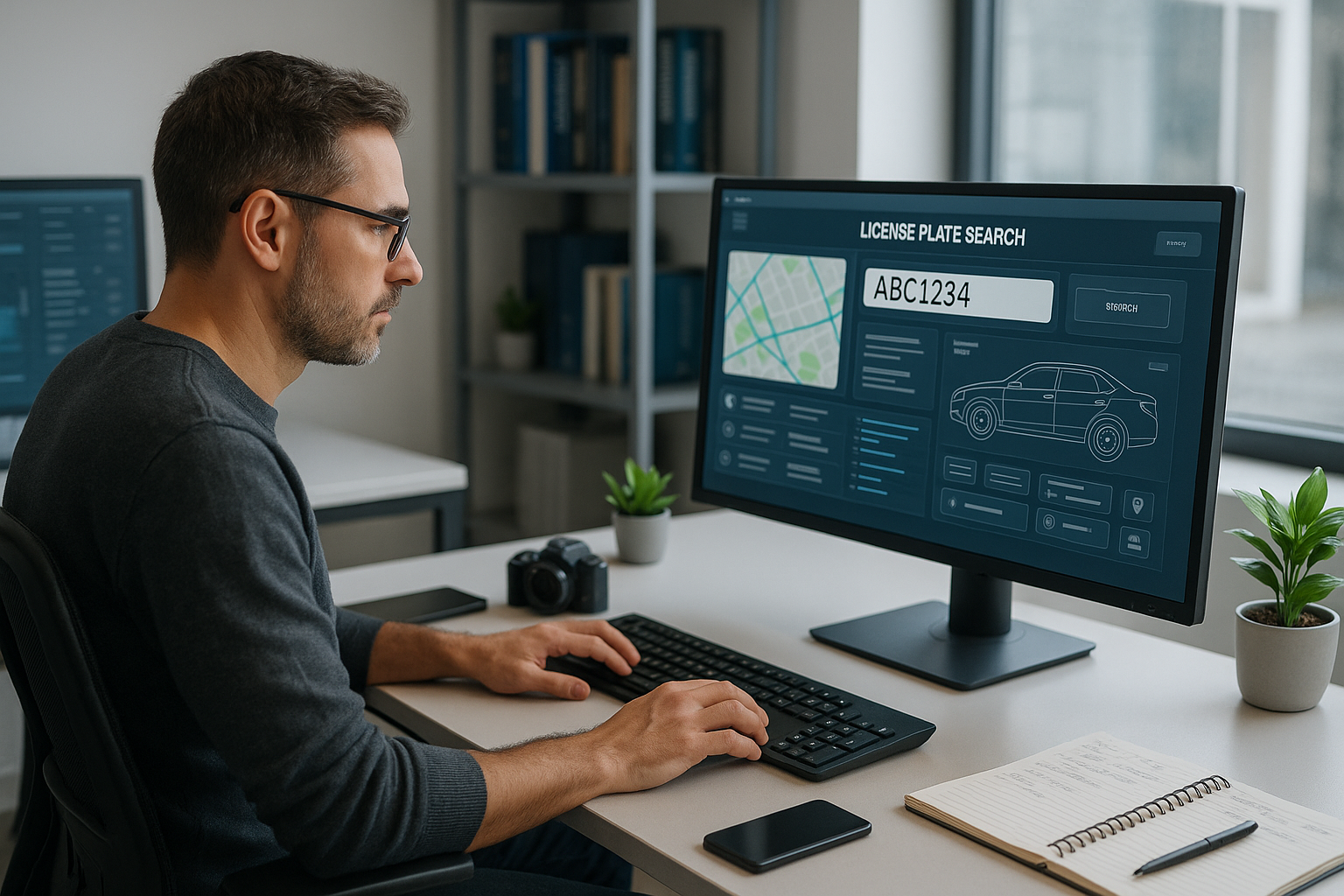Anúncios
Tracking license plates can seem like a complicated process, but it doesn’t have to be. Whether for personal, professional, or legal reasons, learning how to investigate license plates efficiently is a valuable skill.
This comprehensive guide is here to simplify the process, helping you discover reliable methods to find accurate information while staying within the bounds of the law. 🛡️
Anúncios
From understanding what details can be obtained from a license plate to exploring the best tools and resources available, this guide covers it all.
You’ll gain insights into how to navigate online databases, use government platforms, and even identify situations where professional assistance might be necessary. Each step is designed to save time and ensure precise results. 🕒✨
Anúncios
Additionally, we’ll highlight legal considerations you need to know, ensuring that your searches are both effective and compliant.
By the end, you’ll feel confident in your ability to handle license plate research like a pro. Ready to dive into this essential skill? 🚗💡
How to Start Investigating License Plates Like a Pro
Understanding the Basics of License Plate Investigation
Alright, so you want to dive into the world of license plate research? 🚗 Let’s break it down. First things first: license plates are essentially an ID card for vehicles. They’re registered in government databases and tied to specific details like the owner’s name, address, and the car’s make and model. That said, there are proper (and legal) ways to access this information. Understanding these basics is key to doing things the right way.
See more:
- Feel the Road’s Thrill
- Catch Every NFL Game Free!
- Never Miss an NFL Game!
- Catch Every NFL Game Live!
- Never Miss a Touchdown Again!
There are many reasons why you might need to investigate a license plate. Whether you’re dealing with a hit-and-run accident, purchasing a used vehicle, or just feeling extra curious about a car parked suspiciously, it’s important to approach the task responsibly. 🕵️♂️
Most countries have laws about who can access personal information tied to license plates. Some places allow public access to certain data, while others restrict it to law enforcement or authorized professionals. So, before you go digging, make sure to check your local regulations.
Gathering Information Before You Start
Before you jump online or contact an agency, gather as much information as possible. The more details you have, the easier your search will be. Here are some things you’ll want to note:
- The full license plate number: Ensure you have the correct sequence of letters and numbers.
- The state or region of registration: This can make a big difference, as plates are often tied to specific jurisdictions.
- Make, model, and color of the vehicle: These details can help confirm you’re looking at the right car.
Having these details at hand will save you time and help you avoid dead ends. Ready to take the next step? Let’s move on to the actual methods! 🚀
Online Tools to Investigate License Plates
Using Free Online Databases
One of the easiest ways to get started is by using free online resources. There are websites specifically designed to let you look up license plates for basic information. These platforms won’t give you super-detailed results, but they can still be helpful.
- Vehicle history websites: Platforms like Carfax (in the U.S.) or AutoCheck can provide insights into a car’s history, including accidents and title changes.
- DMV (Department of Motor Vehicles) portals: Some regions offer limited public access to license plate records through official government websites.
- Social media or local forums: Believe it or not, platforms like Facebook and Reddit can sometimes help if you post a photo or description (as long as you’re not violating privacy laws).
But here’s the thing: most free tools have limits. If you’re looking for more in-depth details, you’ll probably need to explore paid options or contact official authorities.
Paid License Plate Lookup Services
If free tools aren’t cutting it, paid services might be your next best bet. These platforms typically offer detailed reports that include the car owner’s name, address, and more. Here are some reliable options to consider:
| Service | Key Features | Cost Range |
| BeenVerified | Background checks, license plate lookups, and more | $26-$30/month |
| VINCheckPro | Vehicle history, accidents, and recalls | Free to $10 per report |
| SearchQuarry | License plate and VIN lookups | $5-$20 per search |
These services often require you to create an account and pay for a subscription or individual report. While they can be pricey, they’re incredibly detailed and save you a ton of time.
Legal and Ethical Considerations When Investigating Plates
Knowing What’s Allowed (And What’s Not)
Here’s the deal: not everything is fair game when it comes to license plate research. 🚨 In many places, accessing someone’s personal information without proper authorization is illegal. This is where laws like the Driver’s Privacy Protection Act (DPPA) in the U.S. come into play. These laws are designed to protect sensitive information, so always make sure you’re operating within the boundaries of the law.
When using online tools or third-party services, check their terms and conditions. Some platforms are only intended for specific uses, like law enforcement or insurance purposes. If you’re caught misusing this information, you could face legal consequences. Yikes!
How to Stay Ethical in Your Search
Even if you’re legally allowed to access certain details, it’s important to think about the ethics of your search. Ask yourself:
- Why am I doing this? Is it for a legitimate reason, or are you just curious?
- Am I respecting privacy? Avoid posting or sharing sensitive information online.
- Could this harm someone? Make sure your investigation won’t lead to harassment or misuse.
Staying ethical not only keeps you out of trouble but also ensures you’re respecting others’ rights. Win-win, right?
Offline Methods: When the Internet Isn’t Enough
Contacting Local Authorities
If online searches aren’t giving you the answers you need, you might have to take things offline. In many cases, local police departments or transportation authorities can assist with license plate investigations. Here’s how you can approach this:
- File a report: If you’re dealing with an accident or suspicious activity, filing a police report is often the first step.
- Request information: Some agencies allow individuals to request certain details through formal applications, especially if you have a valid reason.
- Be patient: Government agencies can take time to process requests, so don’t expect instant results.
This method is usually more formal and time-consuming, but it’s a reliable way to ensure you’re operating within the law.
Hiring a Private Investigator
If all else fails, hiring a private investigator (PI) might be the way to go. These professionals are trained to gather information discreetly and legally. While this option can be expensive, it’s often the most effective for complex cases.
Before hiring a PI, make sure they’re licensed and reputable. Ask about their methods and what kind of information they can legally obtain. This ensures you’re getting the best service possible without crossing any legal lines.

Conclusion
Conclusion: Investigate License Plates Like a Pro – Easy, Legal, and Effective! 🚗
In conclusion, investigating license plates doesn’t have to be an overwhelming or legally questionable process. By understanding the fundamentals of license plate research, gathering key details beforehand, and leveraging the right online and offline tools, you can navigate this task with ease and confidence. Whether you’re using free databases, opting for paid services like BeenVerified or VINCheckPro, or even consulting local authorities, each method has its unique benefits depending on your specific needs.
However, it’s crucial to always stay within the bounds of the law. Familiarize yourself with regulations like the Driver’s Privacy Protection Act (DPPA) and ensure that your actions respect both legal and ethical guidelines. Remember, not every piece of information is meant to be accessed without proper authorization. 🔒 Maintaining respect for privacy ensures that your investigation is both effective and responsible.
Additionally, for more complex cases or when online methods fall short, offline approaches like contacting authorities or hiring a licensed private investigator can be valuable alternatives. These avenues may take longer but guarantee reliability and adherence to legal protocols.
By following this comprehensive guide, you’re now equipped to investigate license plates like a pro—quickly, legally, and efficiently. So, whether you’re resolving a personal concern or conducting research, this process can be done responsibly and with peace of mind. 🌟
